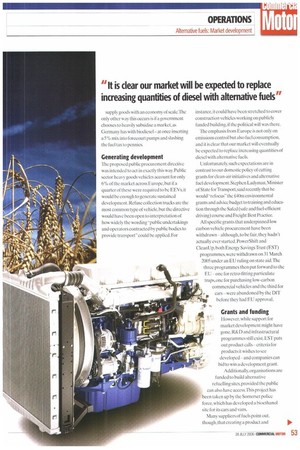It is clear our market will be expected to replace increasing quantities of diesel with alternative fuels"
Page 53

If you've noticed an error in this article please click here to report it so we can fix it.
supply goods with an economy of scale.The only other way this occurs is if a government chooses to heavily subsidise a market, as Germany has with biodiesel -at once inserting a 5% mix into forecourt pumps and slashing the fuel tax to pennies.
Generating development rlhe proposed public procurement directive was intended to act in exactly this way. Public sector heavy goods vehicles account for only 6% of the market across Europe, but if a quarter of these were required to be EEVs, it would be enough to generate sustained development. Refuse collection trucks are the most common type of vehicle, but the directive would have been open to interpretation of how widely the wording "public undertakings and operators contracted by public bodies to provide transport" could be applied. For instance, it could have been stretched to cover construction vehicles working on publicly funded building, if the political will was there.
The emphasis from Europe is not only on emissions control hut also fuel consumption, and it is clear that our market will eventually be expected to replace increasing quantities of diesel with alternative fuels.
Unfortunately,such expectations are in contrast to our domestic policy of cutting grants for clean-air initiatives and alternative fuel development. Stephen Ladyman. Minister of State forTransport,said recently that he would "refocus" the £40m environmental grants and advice budget to training and education through the Safed (safe and fuel-efficient driving) course and Freight Best Practice.
All specific grants that underpinned low carbon vehicle procurement have been withdrawn although, to be fair,they hadn't actually ever started. PowerShift and CleanUp, both Energy Savings Trust (EST) programmes, were withdrawn on 31 March 2005 under an EU ruling on state aid.The three programmes then put forward to the i■Lk. EIJone for retro-fitting particulate traps, one for purchasing low-carbon commercial vehicles and the third for cars were abandoned by the Dfr before they had EU approval.
Grants and funding
However, while support for market development might have gone. R&D and infrastructural programmes still exist. EST puts out product calls-criteria for products it wishes to see developed-and companies can bid to win a development grant. Additionally, organisations are funded to build alternative refuelling sites, provided the public can also have access.Th is project has been taken up by the Somerset police force, which has developed a bioethanol site for its cars and vans.
Many suppliers of fuels point out. though, that creating a product and
























































































































































































